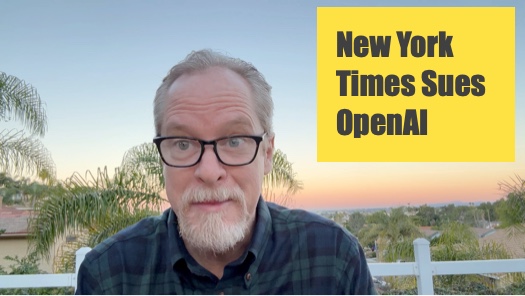2 min read
AI's Aha! Moment: Can Machines Be Creative Without Stealing?
Damon Torgerson : Feb 7, 2024 7:15:00 AM

Ideas rarely burst fully-formed into our minds like Athena from Zeus' head. More often, flashes of genius stitch together bits of knowledge we accumulate from reading, collaborating, dreaming. Now, AI systems like ChatGPT are challenging what "learning" means.
As an ex-superintendent preparing educators for AI's ascendance in schools, I was fascinated to learn the New York Times is SUING ChatGPT's creators! Why? For letting their algorithms ingest tons of copyrighted articles without permission while "training" to generate human-like content.
Yet all of us read and remix ideas every day to spark new insights. So how can machines do the same without allegations of theft? What does it mean for creativity, ownership and plagiarism when AI can sample humanity's output, combine influences with uncanny wit and originality?
These urgent debates will shape education's landscape as AI proliferates in classrooms. With stakes so high, I aim to make sure all school staff grasp the promise and perils ahead. Because this uncharted future is already HERE...and ideas driving seismic change are multiplying faster than we can comprehend.
Transcript
Today, I started thinking about where do ideas come from?
It's really rare that a creative idea just pops into your head. I think it does happen, happens to some people more than others, but really ideas are generally com combination of all different bits of knowledge, collaboration, reading, things you've seen, things you've previously thought about, dreams, other people's ideas, and you mix those together. And that's where I think new ideas come from.
Interestingly enough, this is now a question in AI.
I've talked a lot about chat g p t, and I saw today that the New York Times is suing the makers of Chat GPT.
Because saying that they did not have permission to use written material, in the, quote, training of the AI.
This is fascinating to me. I know that classroom teachers are concerned about AI in terms of plagiarism.
Students using AI to write papers. There's so much to discuss and unpack there, but now this is even more fascinating to me.
The idea that some authors both fiction and non fiction, along with the New York Times would be suing the makers of Chat GPT because their AI read their information without permission.
But the information's out there for all of us to read.
So fascinating. This is an unprecedented time in public education. I wanna make sure that all of our k twelve educators are very, very well prepared for this coming wave. Of artificial intelligence and education.
One way to do that is to make sure that everybody who works in your organization who works with children is aware of the potential and some of the pitfalls related to artificial intelligence and education.
Again, fascinating news. I'm sure you've seen it yourself, but, just couldn't help myself, wanted to make this quick video.
Earn Continuing Education Units in Alludo!
Earn Continuing Education Units from Fresno Pacific University!


